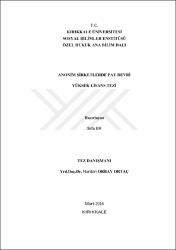| dc.contributor.advisor | Ortaç, Nurdan Orbay | |
| dc.contributor.author | Er, Sefa | |
| dc.date.accessioned | 2021-01-16T18:54:59Z | |
| dc.date.available | 2021-01-16T18:54:59Z | |
| dc.date.issued | 2016 | |
| dc.identifier.uri | | |
| dc.identifier.uri | https://hdl.handle.net/20.500.12587/14394 | |
| dc.description | YÖK Tez ID: 448680 | en_US |
| dc.description.abstract | 6102 sayılı TTK ile anonim şirketlerde pay devrine ilişkin önemli değişiklikler yapılmış olup, 6762 sayılı mülga TTK döneminde olmayan birçok yeni kurum TTK ile hukuk sistemimize girmiştir. Özellikle 6762 sayılı mülga TTK döneminde nama yazılı payların devrinin şirket tarafından sebep gösterilmeksizin dahi reddedilebileceğine ilişkin esas sözleşmeye hüküm konulması kuralı 6102 sayılı TTK'da kabul edilmemiştir. Yeni düzenlemede nama yazılı payların devri borsaya kote edilmiş olmayan ve borsaya kote edilmiş olan paylar olarak ikiye ayrılarak irdelenmiş ve farklı hüküm ve sonuçlara bağlanmıştır. 6102 sayılı TTK'nın esas sözleşmesel bağlama ilişkin hükümleri tamamen yeniden düzenlenmiş, payın devrinin neredeyse sınırsız biçimde yasaklanmasını içeren bir sistemden devrin sınırlanmasının istisna olduğu bir sisteme geçilmiştir. Çalışmamızda özellikle bu yeni sistemin getirdikleri üzerinde durularak, karşılaşılacak sorunlar belirlenmeye çalışılmıştır. Çalışmamızda 6102 sayılı TTK ile getirilen yenilikler ve bunlara ilişkin hüküm ve sonuçlar ile öğretideki tartışmalar etraflıca incelenmiştir. Üç bölümden oluşan çalışmamızın ilk bölümünde anonim şirketlerin temel kavramları olan pay, pay sahipliği ve pay sahipliğinin kazanılması kavramları incelenmiş, ikinci bölümde ise çalışmamızın temel konusu olan payın devir prosedürü ve payın devrinin hukuki sonuçları ele alınmıştır. Ayrıca bu bölümde esas sözleşmesel bağlam, kanuni bağlam, önemli sebep ve kaçış klozu gibi kavramlar ayrıntılı olarak incelenmiştir. Son bölümde ise payın devredilmesini engelleyen veya kısıtlayan kanuni düzenlemeler incelenmiş, özellikle TTK ile yeniden düzenlenen şirketin kendi paylarını devralması kurumu üzerinde ayrıntılı olarak durulmuştur. | en_US |
| dc.description.abstract | By the Turkish Commercial Code (Law no. 6102) (hereinafter – "the TCC"), significant amendments have been made concerning the transfer of shares in joint stock companies, and many institutions that did not exist when the former TCC (Law no. 6762) was in force have been entered into our legal system by the TCC. In particular, the rule of insertion of a provision into the articles of association concerning the fact that transfer of registered shares may be rejected by the company without even giving any reason has not been acknowledged in the new TCC (Law no. 6102). In the new regulation, the transfer of registered shares is addressed in two parts which are (i) companies that are quoted on the stock exchange and (ii) companies that are not quoted on the stock exchange, and different provisions and consequences are envisaged. The provisions of the TCC (Law no. 6102) regarding the share transfer restrictions brought under the articles of association have been reformulated completely, and the system including the prohibition of transfer of shares almost without restraint has been replaced with a system in which imposing restrictions on transfer of shares is exceptional. This study puts emphasis on, in particular, innovations introduced by the new system, and the problems to be faced are tried to be established in the study. This study examines in detail the innovations introduced by the TCC (Law no. 6102), the provisions and outcomes related to these innovations and the debates in the doctrine. In the first section of the study that consists of three sections, the notions of "share", "shareholding" and "acquisition of shareholding" which are the basic notions of joint stock companies are examined. In the second section, the procedure for transfer of shares and the legal consequences of transfer of shares, which are the main subjects of this study, are addressed. Notions such as "share transfer restrictions brought under the articles of association of joint stock companies", "legal restriction", "significant reason" and "escape clause" are also examined in detail in this section. In the last section, legal regulations hindering or restricting the transfer of shares are examined, and the takeover of shares by a company that is the owner of those shares, which is reformulated by the TCC, is elaborated. | en_US |
| dc.language.iso | tur | en_US |
| dc.publisher | Kırıkkale Üniversitesi | en_US |
| dc.rights | info:eu-repo/semantics/openAccess | en_US |
| dc.subject | Hukuk | en_US |
| dc.subject | Law | en_US |
| dc.subject | Antihipertansif ajanlar | en_US |
| dc.subject | Antihypertensive agents ; Ateroskleroz | en_US |
| dc.subject | | en_US |
| dc.subject | | en_US |
| dc.subject | | en_US |
| dc.subject | | en_US |
| dc.title | Anonim şirketlerde pay devri | en_US |
| dc.title.alternative | Transfer of shares in joint stock companies | en_US |
| dc.type | masterThesis | en_US |
| dc.contributor.department | KKÜ, Sosyal Bilimler Enstitüsü, Özel Hukuk Anabilim Dalı | en_US |
| dc.identifier.startpage | 1 | en_US |
| dc.identifier.endpage | 156 | en_US |
| dc.relation.publicationcategory | Tez | en_US |
















